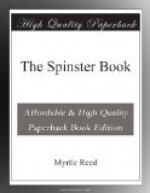[Sidenote: Love]
Love! The delight and the torment of the world! The despair of philosophers and sages, the rapture of poets, the confusion of cynics, and the warrior’s defeat!
Love! The bread and the wine of life, the hunger and the thirst, the hurt and the healing, the only wound which is cured by another! The guest who comes like a thief in the night! The eternal question which is its own answer, the thing which has no beginning and no end!
The very blindness of it is divine, for it sees no imperfections, takes no reck of faults, and concerns itself only with the hidden beauty of the soul.
It is unselfishness—yet it tolerates no rival and demands all for itself. It is belief—and yet it doubts. It is hope and it is also misgiving. It is trust and distrust, the strongest temptation and the power to withstand it; woman’s need and man’s dream. It is his enemy and his best friend, her weakness and her strength; the roses and the thorns.
Woman’s love affairs begin in her infancy, with some childish play at sweethearts, and a cavalier in dresses for her hero. It may be a matter of affinity in later years, or, as the more prosaic Buckle suggests, dependent upon the price of corn, but at first it is certainly a question of propinquity.
Through the kindergarten and the multiplication table, the pretty game goes on. Before she is thirteen, she decides to marry, and selects an awkward boy a little older for the happy man. She cherishes him in her secret heart, and it does not matter in the least if she does not know him well enough to speak to him, for the good fairies who preside over earthly destinies will undoubtedly lead The Prince to become formally acquainted at the proper time.
[Sidenote: The Self-Conscious Period]
Later, the self-conscious period approaches and Mademoiselle becomes solicitous as to ribbons and personal adornment. She pleads earnestly for long gowns, and the first one is never satisfying unless it drags. If she can do her hair in a twist “just like mamma’s,” and see the adored one pass the house, while she sits at the window with sewing or book, she feels actually “grown up.”
When she begins to read novels, her schoolmates, for the time being, are cast aside, because none of them are in the least like the lovers who stalk through the highly-coloured pages of the books she likes best. The hero is usually “tall and dark, with a melancholy cast of countenance,” and there are fascinating hints of some secret sorrow. The watchful maternal parent is apt to confiscate these interesting volumes, but there are always school desks and safe places in the neighbourhood of pillows, and a candle does not throw its beams too far.
The books in which the love scenes are most violent possess unfading charm. A hero who says “darling” every time he opens his finely-chiselled mouth is very near perfection. That fondness lasts well into the after-years, for “darling” is, above all others, the favourite term of endearment with a woman.




